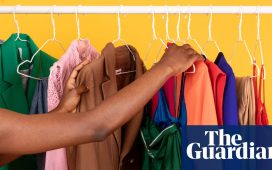He has shops on the coolest streets of New York, Paris, London and Seoul, with two Beijing flagships having opened last year. He’s good mates with Louis Vuitton’s Virgil Abloh, Burberry’s Riccardo Tisci and Kanye West, and has Naomi Campbell and Edward Enninful RSVPing to his launch parties around the world. But Ben Gorham still might be one of the most influential people you’ve never heard of.
You are, however, likely to be familiar with his brainchild, Byredo. The brand is, after all, largely responsible for the reason you may have coveted a designer candle or boutique perfume in the last decade. Since its launch as a fragrance brand in 2006, it has become a byword for independent cool, with multiple new categories – including handbags, eyewear, trainers, men’s tailoring and, most recently, jewellery – taking it from modest to major player.
However, if this sounds like a straightforward success story, it is anything but. At 42, Gorham’s trajectory is one that makes him also one of the most inspiring people you’ve never heard of.
Born in Sweden, he and his sister were raised by their Indian single mother. When he was 11, she took the family to Toronto where his first love was basketball. Interested in school only for the access it gave him to the sport, he trained for four or five hours a day and – encouraged by his mother – moved back to Europe after college to pursue basketball professionally. “She grew up in a garage in Mumbai with five brothers and was extremely poor,” he says, “but somehow she related to my passion for basketball and her support was key.”
It was, however, not to be. While he assumed that he would be able to stay in Sweden indefinitely, given his Swedish birth, “technicalities” with his immigration process took three years to iron out, by which point his sports contracts had dried up. At 25, feeling unable to return to Canada, he found himself getting up at 4.30am to work long hours on construction sites.
“I left being all ‘I’m going to do this’ and ‘This is going to happen,’” he recalls, “and so I stayed in Sweden with some level of shame or defeat. Looking back, it was one of the low points of my life – all these dreams came crashing down with the realisation that not only was who I thought I was irrelevant, but who I thought I was going to be was also irrelevant,” he says, his imposing 6ft 5in frame somehow surprising for someone so mild- mannered and softly spoken. “I was Ben the basketball player who was really talented, popular and confident and then I was just Ben. It was an existential crisis.”
Pivotally, he continues in his gentle Canadian tones, “from that low came immense drive” and he discovered an interest in art. It was “an echo” that stemmed from his college days – when he chopped and changed his courses from business to political science to interior design to architecture. He put his head down and graduated with a degree in fine art from Stockholm Art School shortly after.
With art and fashion natural bedfellows, it’s not a stretch to see how he developed his interest in style over this period, but it would be the art of fragrance that would first pique his interest after a chance encounter with the perfumer Pierre Wulff in 2004. Sometime later, with investors and advisers on board, a business plan drawn up and “a dotcom” bought, Byredo was born.

“I had no experience in olfactory – or bags or sneakers, or building a store or opening a cash register,” he smiles. “I was quite naive at first, but learning by doing has been my formula.” This open-minded attitude makes Gorham something of a role model for a new generation of people who, instead of seeing boundaries in professional pursuits, are polymaths. When asked why, the answer is, “Why not?” If Gorham finds synergy with a product, he doesn’t see an obstacle in pursuing it – even if it seems out of keeping with the other products he sells.
“This has been hard for people to fathom. One of the challenges over the decade has been this idea that people like to put things into boxes,” he says, reasoning that “a woman’s handbag possesses a level of intimacy similar to that of a woman’s perfume, because it’s about expressing who you are.”
Gorham’s penetration of the world of luxury perfume and fashion has also been a perceptive one. “I remember looking at brand narratives and thinking they were old. Luxury, as an idea, was intimidating and I felt there could be an approach to it that was inclusive – this was before that word was used so much.”
“Coming from an ethnic background,” he says, “growing up listening to hip-hop and going to an all-black and Latino high school, understanding culture and race, and travelling a lot,” he was keen to dispel the idea that brands needed cultural identity. “I would just say, mine doesn’t have one – it’s as diverse as myself.”
This open-minded, fluid perspective informs his business practice. His deliberate eschewing of marketing, for example, was not only because he was unable to compete “with the likes of Gucci”, but because he didn’t think it was a way to grow a business organically. “I felt like advertising was a bit like steroids – what happens when you stop taking your steroids?” he laughs. In addition, he’s kept all his products at both accessible and aspirational prices – ranging from £30 to £5,000 – and has sought the advice of artists rather than analysts to entice customers.
“With consumer goods, people think there is this need to completely explain what they are selling somebody; they think if people understand it, they’ll buy it. In art, it’s different because if the subject is understood completely, there is a tension lost and it makes the art less interesting.” This theory accounts for his stripped-back branding, multiple cross-genre projects and his shops, which have been designed to feel deliberately different. “Learning to gauge yourself and know that you do not have to spell it out for everybody, that people are intelligent, complex and emotional – that’s an important part of any experience.” When it comes to his own positioning, he explains that “there’s a part of me that wants to say, ‘You don’t know everything.’ I want to surprise, and I want to inspire.”
He adds that, along with Virgil Abloh (the first black designer of the world’s largest luxury house), he still considers himself an outsider when it comes to the luxury industry. “We have attained a certain level of acceptance from people and have created an audience, but I don’t think we’ve been institutionalised – we’re not them. We’re still working in their industry, but in a different way. There’s a sobriety tied to it. Take a step back and things are quite different.”
Living in Stockholm with his wife, Natasha, and their daughters, Inez, 10, and Anouk, five, helps with this perspective. “My daughter is going through a stage where her parents are awkward and uncool,” he smiles, “but I’m told she’ll come back to me.” Life revolves around the school run, his studio and outdoor sports that are “his reset” – his favourite being trips to Alaska to cold-water surf in a 6mm wetsuit, something he only learned recently. “I’m not thinking about budgets when I’m lying on that board,” he laughs.
Such distance must help him reflect on his achievements. “I find myself in a state sometimes where I feel humbled, but I don’t feel surprised,” he says, frankly. “It feels like it was always meant to be. From being a child in a suburb in Stockholm, watching Michael Jordan on a video and saying: ‘I wanna be that guy’; I’ve always aimed high.”














